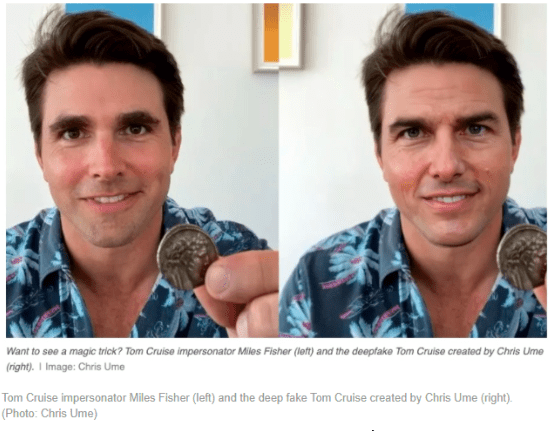
The internet has become both a place of knowledge and opportunity and a place where it’s hard to know what to believe.
Just when people begin to get used to “photoshopping” and spotting fake images, the scammers take things up a notch. That new notch happens to be Deepfake videos.
Deepfakes are videos that make it seem like someone is on camera saying or doing something that they never actually said or did. These impostor videos have become very good and easy for the novice to mistake for the real thing.
While not all Deepfakes are malicious, such as the many out there spoofing Tom Cruise, this technology opens the door for all types of manipulation and phishing to be used to cause harm and scam people out of money.

Image from KSL Newsradio article
What Are Ways That Deepfakes Can Be Used Maliciously?
The ability to fool someone and have them think someone they know is saying something they never actually said can be used for all types of unsavory reasons that put your online security at risk.
While we haven’t seen all of these yet, it’s only a matter of time before Deepfakes become more widespread and begin being used by cybercriminals in their online money-making scams.
Some of the dangers of these types of videos include:
- Stock manipulation
- Spear phishing (a deep fake could be emailed to employees making it look like the CEO is asking them to click a link or send direct deposit data)
- Extortion (an illicit fake video can be made that gets someone to pay to keep it from being released)
- Misinformation campaigns
- And more
How Do Deepfakes Work?
Special software is used to make a Deepfake video. The creator just needs to have footage of the target and footage of an actor that is a similar build and dressed similarly. The closer the actor looks to the person being faked, the more realistic the video appears.
The footage from the target and the actor are fed into the software and the software swaps in one face for another.
To the untrained eye, it looks like the celebrity or other well-known person is on video saying something they never actually said.
Tips for Spotting a Fake Video
Teeth Look Plastic or Unreal
One of the facial components that is difficult to match up when doing a face swap is teeth. If the teeth look fake or like they don’t quite fit the person’s mouth properly, then there is a good chance the video is a Deepfake.
Strange Eye Movement
Eye movements can be out of the norm in a fake video. For example, telltale signs include rapid blinking or blinking that seems too slow or abnormal in some other way.
Lips Not Syncing With the Voice
The voice has to be synced with the swapped face for a Deepfake to work, and this isn’t always done perfectly.
If the video shows signs of lip-syncing, where the words aren’t quite lined up with the lip movements, then it may be an impostor.
Edges of the Hair Not Cropped Properly
It’s very difficult to properly crop around fuzzy edges like hair. If hair looks like it ends abruptly and doesn’t look quite natural around the edges, this is a sign that another person’s face was overlaid onto the background.
Strange Reflections in Eyes or Glasses
Reflections are another giveaway of a Deepfake. If it looks like reflections in the person’s eyes or glasses don’t quite match the lighting or background (like a city reflection when the background is the beach), then you’ll want to be very suspicious about the content of that video.
Facial Expression Seems “Off”
How well the face-swapping algorithm of the software works depends on multiple factors, and if the videos that are fed into the system don’t have enough data, then data loss can result in missing facial expression lines.
If it looks like the person’s facial expressions are off in some way or they’re looking robotic, then there is a good chance the video is not real.
The Person is Saying Something Out of Character
One of the first things you should ask yourself when viewing videos on the internet is whether they seem out of character or are designed to get a reaction.
Deepfakes will generally make it appear as if a well-known person is saying something outrageous or completely out of character. They’re often designed to get a guttural reaction that results in clicks, comments, likes, and shares.
Be suspicious of anything that you can tell is designed for shock value and do further research. Often just searching for the subject of the video with the word “deepfake” will bring up information on how “real” it really is.
Keep Your PC Safe When Exploring Online With Cloud Care Pro™
The internet can be a dangerous place and one wrong click can invite a virus infection. Pro Tech Guy can help your Framingham home or business with an essential PC protection package through our Cloud Care Pro™ plan.
Contact us today to learn more. Call 508-364-8189 or reach us online.
